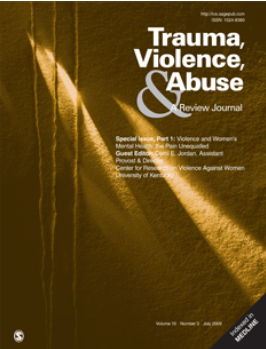性暴力污名化的社会心理后果:范围界定审查
IF 5.4
1区 社会学
Q1 CRIMINOLOGY & PENOLOGY
引用次数: 0
摘要
在过去的十年中,学者们一直在探索与性暴力(SV)相关的耻辱感是否是导致性暴力后精神病理学和相关合并症的风险因素。我们进行了一次范围综述,总结并评估了这一新兴文献的现状。我们从 Pubmed、APA PsychInfo、Embase、CINAHL Plus、Social Science Premium 和 Web of Science 中纳入了量化 SV 相关污名的研究。我们按照 PRISMA-SCR 范围界定综述指南对研究进行了筛选和摘录。我们的最终样本包含 62 项研究。我们探讨了有关 SV 耻辱化的两个关键问题。首先,SV 是否是一种污名化状态?文章(n = 14)通过一系列方法(如小故事)和结果(如对社会距离的渴望)提供了潜在鄙视者(如可能使鄙视永久化的个人)对 SV 鄙视的证据。其他研究(n = 20)也证实了研究对象(即 SV 幸存者)对 SV 耻辱化的看法。其次,SV 诋毁会带来哪些社会心理后果?我们回顾了一些研究(n = 28),这些研究表明,在经历过多种类型 SV(如童年性虐待和性侵犯)的个体中,SV 诋毁与一系列不良的社会心理后果相关,包括焦虑、抑郁、创伤后应激障碍、酗酒问题和躯体症状。因此,新出现的证据表明,SV 耻辱化可能是 SV 暴露后风险和康复的关键决定因素。然而,我们也发现了一些局限性,包括对 SV 耻辱感的测量并不一致,文献中也没有完全纳入耻辱感的概念,如隐瞒和结构性耻辱感。我们提出了几项建议,以推进这项工作。本文章由计算机程序翻译,如有差异,请以英文原文为准。
The Psychosocial Consequences of Sexual Violence Stigma: A Scoping Review
Over the past decade, scholars have explored whether the stigma associated with sexual violence (SV) represents a risk factor for psychopathology and related comorbidities following SV. We conducted a scoping review to summarize and evaluate the state of this burgeoning literature. We included studies from Pubmed, APA PsychInfo, Embase, CINAHL Plus, Social Science Premium, and Web of Science that quantified stigma related to SV. Studies were screened and abstracted in accordance with the PRISMA-SCR guidelines for scoping reviews. Our final sample contained 62 studies. We address two key questions about SV stigma. First, is SV a stigmatized status? Articles ( n = 14) provided evidence for SV stigma among potential stigmatizers (e.g., individuals who may perpetuate stigma) across a range of methods (e.g., vignettes) and outcomes (e.g., desire for social distance). Additional work ( n = 20) corroborates perceptions of SV stigma among targets (i.e., SV survivors). Second, what are the psychosocial consequences of SV stigma? We reviewed studies ( n = 28) demonstrating that SV stigma is correlated with a range of adverse psychosocial outcomes—including anxiety, depression, posttraumatic stress disorder, problematic drinking, and somatic symptoms—among individuals experiencing multiple types of SV (e.g., childhood sexual abuse and sexual assault). Thus, emerging evidence suggests that SV stigma may be a critical determinant of risk and recovery following SV exposure. However, a number of limitations were observed, including that SV stigma has not been consistently measured and that the literature has not fully incorporated stigma constructs, such as concealment and structural stigma. We offer several recommendations to advance this line of work.
求助全文
通过发布文献求助,成功后即可免费获取论文全文。
去求助
来源期刊

Trauma Violence & Abuse
Multiple-
CiteScore
13.60
自引率
7.80%
发文量
131
期刊介绍:
Trauma, Violence, & Abuse is devoted to organizing, synthesizing, and expanding knowledge on all force of trauma, abuse, and violence. This peer-reviewed journal is practitioner oriented and will publish only reviews of research, conceptual or theoretical articles, and law review articles. Trauma, Violence, & Abuse is dedicated to professionals and advanced students in clinical training who work with any form of trauma, abuse, and violence. It is intended to compile knowledge that clearly affects practice, policy, and research.
 求助内容:
求助内容: 应助结果提醒方式:
应助结果提醒方式:


